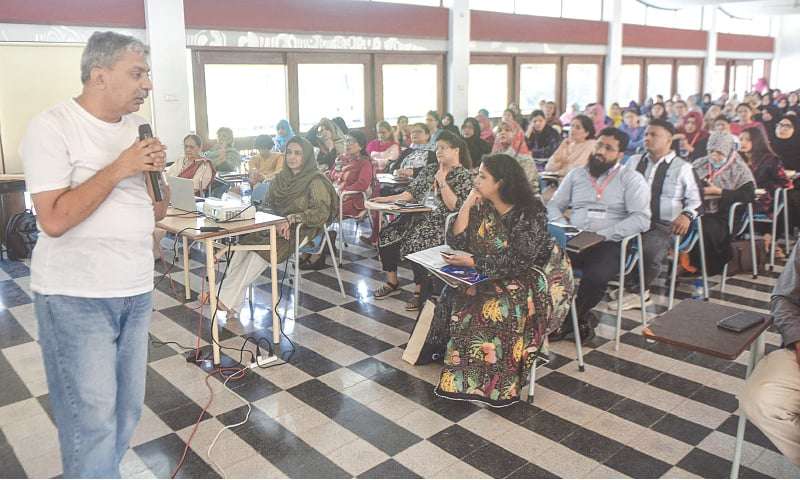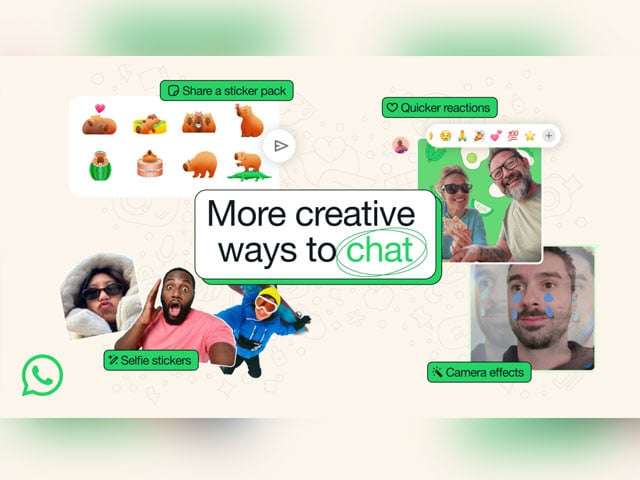KARACHI: The 40th Society of Pakistan English Language Teachers (SPELT) International Conference, themed “Transitions in ELT: Past, Present, and Future,” commenced in Karachi, marking a significant event in the education sector. This two-day conference, held across five different venues—Habib Public School, Government Elementary College of Education, Happy Home School System, IU School System, and Habib University—featured a multitude of sessions including keynote addresses, panel discussions, and interactive workshops. Renowned academics and educators gathered to explore the evolving landscape of English Language Teaching (ELT), with a particular focus on the impact of Artificial Intelligence (AI) on education.
The Evolution of Language and Technology in Education
Opening Remarks by SPELT President
At the Habib Public School venue, SPELT President Mohsin Tejani delivered a compelling welcome address, highlighting the theme of this year’s conference. He emphasized the organization’s commitment to leveraging technology for enhancing teaching methodologies. “We have raised the bar for what we do well as we have enhanced this conference to 5X,” Tejani declared. He discussed the importance of equipping teachers with the necessary tools to adapt to modern educational landscapes powered by AI. “Technology should empower teachers, not replace them,” he asserted, underscoring the role of AI in augmenting rather than diminishing the human element in education.
The Role of AI in Modern Education
Habib Public School’s Principal Minhas Tejani shared insights on the cautious yet open-minded approach needed to integrate AI into education. He candidly admitted using ChatGPT to compose his speech, thereby bringing the keynote topic into sharp focus. This set the stage for the keynote address by Dr. Shah Jamal Alam, Associate Professor of Computer Science at Habib University, who delved into the potential and pitfalls of AI in education.
Keynote Address: Generative AI and the Future of Education
Understanding AI’s Pervasive Influence
Dr. Alam began his address by acknowledging AI’s ubiquitous presence in today’s world. “AI touches you one way or the other. It is part of life,” he stated, setting the tone for a thought-provoking session. He referenced Google’s 2001 initiative to digitalize all books in the Library of Congress, highlighting the promise and challenges of such ambitious projects. “Google digitalized human wisdom as represented through text in published books and textbooks for AI,” he explained, noting the limitations of relying solely on published texts for comprehensive wisdom.
Challenges and Ethical Considerations
Dr. Alam addressed the ethical dilemmas posed by AI in academic research, citing instances where AI-generated content created significant issues. He illustrated this with an AI-generated image of Leonardo da Vinci and the Mona Lisa, emphasizing the potential for misinformation. “Today, Richard Feynman, the scientist who died in 1988, has an X handle from where he even posted about Covid-19,” he noted, highlighting the absurdity and risks of AI-generated historical inaccuracies.
AI and Plagiarism Concerns
One of the most pressing concerns Dr. Alam raised was AI’s impact on plagiarism. “AI can generate writing and pictures that mimic the style of renowned poets like Ghalib, Iqbal, or Faiz, but these are not their works,” he warned. This phenomenon poses a significant challenge to academic integrity, as AI-generated content can blur the lines between original and replicated work.
Interactive Sessions and Workshops
Empowering Educators Through Technology
The conference featured numerous interactive sessions and workshops designed to equip educators with practical skills for integrating AI into their teaching practices. These sessions emphasized the importance of maintaining a balance between technology and traditional teaching methods. Educators were encouraged to explore AI as a tool to enhance their teaching capabilities rather than viewing it as a replacement.
Addressing Shortcomings and Enhancing Learning
Participants engaged in discussions about the potential shortcomings of AI in education and explored strategies to mitigate these issues. The sessions highlighted the need for continuous professional development and the importance of ethical considerations when incorporating AI into educational frameworks.
ALSO READ:
https://flarenews.pk/2024/11/17/stock-exchange-sees-yet-another-record-setting-week/
Conclusion: Navigating the Future of AI in Education
The Path Forward
The 40th SPELT International Conference underscored the transformative potential of AI in education while acknowledging the challenges it presents. The discussions emphasized the need for a balanced approach, where AI is harnessed to complement and enhance traditional teaching methods. As AI continues to evolve, educators must remain vigilant and proactive in addressing ethical concerns and ensuring that technology serves as a tool for empowerment rather than a source of division.
Frequently Asked Questions (FAQs)
1. How can AI be integrated into classroom teaching?
AI can be integrated into classroom teaching through personalized learning platforms, intelligent tutoring systems, and automated grading systems. These tools can help tailor educational experiences to individual student needs and provide teachers with valuable insights into student performance.
2. What are the ethical concerns related to AI in education?
Ethical concerns include issues of privacy, data security, and the potential for AI to perpetuate biases present in training data. Additionally, there are concerns about the authenticity of AI-generated content and its impact on academic integrity.
3. How can educators address the challenges posed by AI-generated plagiarism?
Educators can address AI-generated plagiarism by implementing robust plagiarism detection tools, promoting academic integrity, and encouraging students to develop critical thinking and original writing skills. Awareness and education about the limitations and ethical use of AI are also crucial.
4. What role does AI play in personalized learning?
AI plays a significant role in personalized learning by analyzing student data to create customized learning plans. It can adapt content delivery based on individual learning styles, pace, and performance, thereby enhancing student engagement and outcomes.
5. How can schools ensure that AI empowers rather than replaces teachers?
Schools can ensure that AI empowers teachers by providing professional development opportunities focused on AI literacy and its applications in education. Teachers should be encouraged to use AI as a supportive tool to enhance their teaching strategies and improve student learning experiences.



